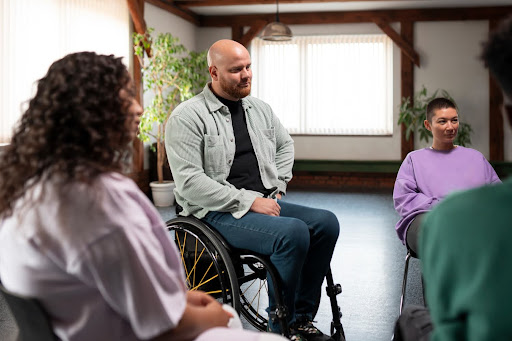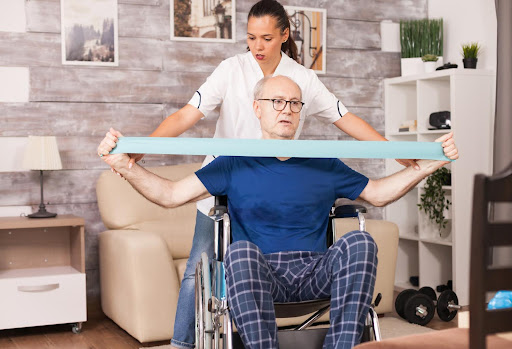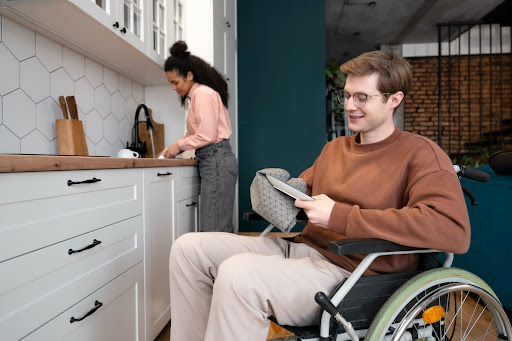NDIS Therapy Support Physical, Occupational, and Speech

Accessing the extensive therapy support options provided under the NDIS takes much work. The NDIS therapy services or assistance facilitate quality life improvement for someone with a disability. Individuals increase their independence by carrying out activities found indispensable with the help of therapy assistance in an NDIS plan. Therapy support is an essential feature in the NDIS plan, including physical, occupational, and speech therapy. Each treatment style serves a purpose in developing specific areas where the participant needs development, enabling them to maximize their potential and lead whole lives.
Understanding NDIS Therapy Support
Therapy support provides people with services that help them build, rehabilitate, and grow in many areas of life. The supports are designed to assist persons in finding their way out of specific difficulties. A full range of services offered by the NDIS in Melbourne ensures that every person gets the proper support based on their needs.
The four primary forms of therapy support are as follows:
- Physical Therapy: Intended to help people to become more mobile, strong, and functionally fit.
- Occupational Therapy: Comprises training for clients in acquiring the skills that enhance their capability of daily living and independence.
- Speech Therapy: Improves participants' communication, language, and swallowing ability.
Understanding the above four would help participants better decide on their therapy needs.
Physical Therapy NDIS: Improving Mobility and Strength

Physical therapy, or physiotherapy, is one of the critical therapeutic service provisions for physically disabled individuals, those with mobility impairments, musculoskeletal disabilities, and many more. NDIS physical therapy is tailored to each individual's physical skills. It helps establish strength, flexibility, and mobilization skills. Enhancing one's ability to perform everyday activities fully and freely enhances independence while minimizing injury potential.
Main Advantages of Physical Therapy Includes:
- Enhancement of Mobility: The therapy increases the participant's strength, which enables them to move around more easily through walking, transferring, or the use of assistive devices.
- Management of Pain: Physical therapy may employ exercises, massage, and stretching techniques that help eliminate pain caused by musculoskeletal or neurological conditions.
- Prevention of Injury: The participants increase their balance, coordination, and flexibility during physical therapy, which helps in decreasing the chances of falling or suffering injuries.
- Improvement of Quality Life: Physical therapy improves physical well-being and, as a result, gives participants a chance to participate more actively in the community and live satisfactory lives.
More importantly, physical therapy is regarded to be most beneficial for a condition like cerebral palsy, muscular dystrophy, or spinal cord injuries when there are physical limitations that require structured support to help keep improving or maintain mobility, respectively.
Occupational Therapy NDIS: Building Daily Living Skills

The primary aim of occupational therapy is to enable NDIS participants to engage in meaningful activities and improve their function capacity within the environment. Occupational therapists assess participants' needs and work on various activities, from self-care or personal grooming to job-related skills and community participation.
- Benefits of Occupational Therapy NDIS: Skilled skills to handle their home and daily life: Occupational therapy enhances the skills necessary for achieving everyday life, which includes dressing up, bathing, cooking, and cleaning.
- Modification and Equipment Prescription: Occupational therapists will prescribe adaptive tools or assistive devices that can make the task easier using a modified utensil, a wheelchair, or customized furniture.
- Home and Environmental Modifications: The occupational therapist can refer to changes that make the home safer and more accessible, for example, installing ramps, grab bars, or handrails.
- Increased Independence: The participants enjoy an actual sense of independence while learning these skills, and their self-esteem is improved, coupled with reduced dependence on caregiver support.
Occupational therapy can be beneficial for a broad spectrum of disabilities and conditions, such as autism, developmental delays, cerebral palsy, and brain injuries. Therapy can accommodate any age category and is usually provided in structured and informal settings according to the participant's needs. NDIS occupational therapy supports are designed to empower individuals to live with greater independence and confidence.
Speech Therapy NDIS: Enhancing Communication Skills
It is an essential life activity, integrated into social interactions, learning, and personal ties, aiming to restore the communication pattern in those suffering from diseases or conditions linked to speech, language, or swallowing difficulties. NDIS offers speech therapy services to individuals whose problems may be due to developmental delays, neurological conditions, or other diseases. Speech therapists work closely with participants to identify means of constructing practical communication tools that help them express themselves more effectively to meet their needs and engage in social situations and relationships.
Critical Benefits of Speech Therapy:
- Speech and Language Improvement: People can communicate effectively and improve vocabulary and understanding.
- Improved Social Interaction: Patients become interested in others and participate more readily in social life as communication improves.
- Support in Swallowing and Feeding: Speech therapists support patients with difficulty swallowing and ensure that eating becomes safer and enjoyable.
- Increased Autonomy: Communication is for self-advocacy, allowing people to express themselves, their needs, and wants.
Speech therapy NDIS is highly helpful to patients who have autism, Down's syndrome, cerebral palsy, and acquired brain injuries. Speech therapists can even administer exercises, games, visual aids, and technology to make therapy fun and effective. NDIS speech therapy support can be availed at home, in school settings, and specialized clinics. This way, participants can work on skills without discomfort.
Choosing the Right NDIS Therapy Support Services
The objectives, the specific problem the individual is facing, and their personal preferences should always be considered when selecting therapy support services. Among the factors to consider in choosing the most appropriate therapy options include:
- Personal Goals: Each type of therapy serves a different purpose; therefore, the participants should undergo therapies based on their purposes. For instance, speech therapy might be prioritized to improve communication.
- Level of Support Required: Some participants might need full-time therapy support, while others require it now and then. The NDIS plan would be flexible enough and apt to provide support on the required levels.
- Environment and Accessibility: Therapies are conducted depending on the participants' preferences and needs, usually conducted in several settings. For example, physical therapy may be administered within a clinic. However, occupational therapy may best be suited at home.
- NDIS plan and funding: Since diverse NDIS plans provide different funding procedures, it would depend on the individual assessments undertaken. That is to say that participants will have to ensure that such funding can support the therapies that they wish to seek. Therefore, working with a support coordinator or NDIS planner will enable participants to choose therapies that fit into the budget of the plan provided.
- Rehabilitation and Progress Tracking: Monitoring progress is the central purpose of maximizing the use of NDIS therapeutic services. The participants are supposed to review their progress as often as possible and alter the therapy plans if needed.
Maximizing NDIS Rehabilitation Support Through Consistency and Engagement
Participants must participate in NDIS rehabilitation support programs to achieve the desired outcomes. Being regular, practicing continually, and interacting with therapists is essential. Realistic expectations and knowing that therapy takes time can motivate the participant. It helps family members, and caregivers accompany participants during the therapeutic process and reinforce the skills practiced by a participant at home while patting the back on little victories.
A Holistic Approach to NDIS Therapy Support
Every type of therapy support is different. It has various benefits, but the most effective therapy will likely combine these types based on a person's needs. For instance, a brain-injured patient might need speech and physical therapy to enhance communication and regain mobility again. However, occupational therapy is a service that helps promote ease and independence in daily activities, with support available through NDIS providers across Melbourne.
Conclusion:
The decision to include therapies in an NDIS plan is not straightforward, but it is easier if one understands the array of available supports. Physical, occupational, and speech therapy have unique virtues that significantly enhance a person's quality of life, independence, and overall well-being.
A personalized plan with a well-rounded mix of therapeutic services will help participants become influential movers, processors, and communicators. Proper investment in the right support and consistent engagement in their therapy journey may ensure meaningful progress toward building lives consisting of opportunities and self-empowerment.